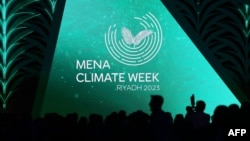Saudi Arabia on Monday unveiled an initiative to allow companies to purchase credits offsetting greenhouse gas emissions, part of the Gulf kingdom's stated goal of hitting net-zero emissions by 2060.
The Greenhouse Gas Crediting and Offsetting Mechanism (GCOM), set to launch in early 2024, "aims to increase cooperation among national entities seeking to fulfill their climate ambitions by helping to mobilize finance in all sectors for a variety of projects and activities", according to its website.
The initiative was announced at the Middle East and North Africa (MENA) Climate Week, a U.N.-organized conference hosted in the Saudi capital Riyadh.
It was designed to align with Article 6 of the 2015 Paris Agreement, which allows countries to cooperate on hitting emissions reduction targets, including by transferring carbon credits.
Saudi officials on Monday described GCOM as a domestic mechanism, though Maria AlJishi, international policy adviser at the Saudi energy ministry, said it "caters to the possibility or the potential for future international transfers if Saudi Arabia chooses to engage".
Carbon credits have become popular tools globally for companies seeking to offset their carbon emissions and proclaim their commitment to the environment.
But the carbon credit industry has faced numerous scandals, revealing a landscape rife with opportunities for greenwashing -- or making deceptive claims of good environmental practice.
Walt Disney, JP Morgan Bank and other major corporations have been accused of purchasing carbon credits from forest protection projects in areas that were not actually at risk of deforestation.
AlJishi told a panel on Monday that Saudi officials were keen to implement safeguards against "double counting and double issuance".
Saudi Arabia announced in 2021 that it was targeting net zero emissions by 2060.
The world's biggest oil exporter says it will reach that goal "in a manner that preserves the Kingdom's leading role in enhancing the security and stability of global energy markets".
Environmental activists are skeptical, pointing to simultaneous calls by Saudi officials for ramped-up investment in fossil fuels.




